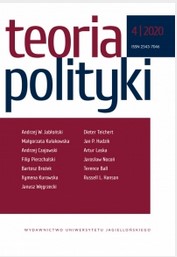Hermeneutics: Polity, Politics, and Political Theory in Gadamer’s Philosophical Hermeneutics
Hermeneutics: Polity, Politics, and Political Theory in Gadamer’s Philosophical Hermeneutics
Author(s): Dieter TeichertSubject(s): Ethics / Practical Philosophy, Political Theory, Political Sciences, Hermeneutics, Ontology
Published by: Wydawnictwo Uniwersytetu Jagiellońskiego
Keywords: Hans-Georg Gadamer; political theory; polity; politics; hermeneutics;
Summary/Abstract: This article discusses the significance of Hans-Georg Gadamer’s philosophical hermeneutics for political science and political theory. As a critical observer of contemporary culture, dominated, as it is, by scientific, bureaucratic, and technological conceptions of the public sphere, Gadamer highlights the rootedness of human interaction and praxis in dialogical exchange. Consequently, according to him, the genuine dimension of politics should be conceived of from the perspective of its participants and not from the point of view of a neutral observer. Building on this methodological assumption, the article reconstructs, first, the analysis of practical knowledge as presented in the early writings of Gadamer. A second step leads to the hermeneutical conception of practical knowledge, which Gadamer articulated through a reinterpretation of Aristotle’s ‘phronesis’. Most centrally, it discusses the consequences of this idea of practical knowledge for an adequate account of understanding. A third section focuses on the late Gadamer’s reflection on political deliberation as an essentially dialogical activity that opens the possibility to elude technological and bureaucratic manipulation.
Journal: Teoria Polityki
- Issue Year: 2020
- Issue No: 4
- Page Range: 123-138
- Page Count: 16
- Language: English

